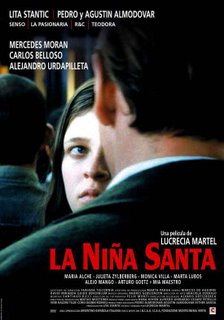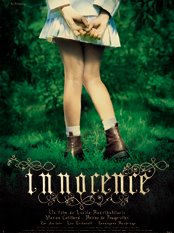
 Two of the very best films of the last few years - both of which I recently saw on DVD - are directed by women, and concern young girls coming of age. Eyewear gives both its highest rating.
Two of the very best films of the last few years - both of which I recently saw on DVD - are directed by women, and concern young girls coming of age. Eyewear gives both its highest rating.Innocence, directed by Lucile Hadzihalilovic, is the more recent (2005) and problematic, as its visual alphabet consists of troubling Nabokovian elements (the butterfly collecting motif gives this literary connection away), such as the poster above amply indicates. However, as the director has said in interview, what the male and female viewer brings to this film is going to be very different, since, for women, the subjects are, in a sense, embodiments of themselves, whereas, for some men, the subject will be the other, and in some senses, one which is taboo. However, beyond such limiting constraints, the film is actually best seen as a richly complex discussion of the idea of experience, aging, and bodily transformation, that teases the viewer into always balancing utterly dark, and then again, joyous, possibilities. This is the anxiety of the fairytale, the dream, taken to one possible series of limits. You'll never think of coffins, ribbons, or trains the same way again.
The Holy Girl, by Lucrecia Martel, is another extraordinary investigation into burgeoning sexuality, though this time more openly portrayed, though no less subtly, and controversially. The story unfolds during a medical convention in a retro-Latin American hotel lit in burnished reds, with strange rooms and a weird pool, and the mise-en-scene manages to be both stylish and uncanny. The master-servant dialectic between the male predator, and the girl on the verge of discovering her experience, raises many questions about sexuality, and even, guilt, that transform ways of thinking about such issues, from both the male and female perspective.
Both these films are exemplary for asking questions about identity, gender, and the subject, without impinging with easily-formed, judgemental, received impressions. They suggest a way forward for the art of cinema, and reflection.
Comments